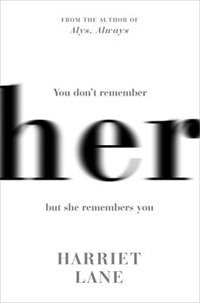
In her latest novel, Her, main characters Emma and Nina are two women living just a short distance apart in a North London neighbourhood. Emma is slowly drowning in domestic malaise, mourning the death of her career aspirations, feeling in equal measure the pressure and the small joys of newborns and toddlers. Her life is describe as, ‘the flat-out invisible drudgery of family maintenance, the vanishing of personality as everyone else’s accrues’.
When the elegant, unflappable Nina suddenly materialises on her doorstep, Emma finds herself a little envious of the self-contained, wealthy, aspirational lifestyle that her new friend seems to enjoy. Nina is a successful painter, has a much older husband and a daughter nearly ready to leave the nest. Nina seems ever watchful, ever helpful, unaccountably attracted to the boring company which Emma fears she is providing. Of course, as readers we know more. We know that Nina’s serenity is a façade, that she is harbouring malicious thoughts of revenge because of a horrific incident which forms the crux of the plotline.
Harriet Lane gives us two different accounts of this incident, via different pairs of eyes. It’s a clever device, but the way this is handled does mean it gets a bit repetitive. One or two tasters of it would have been enough to give us that sense of ominous, impending doom. It comes down to what it is Nina wants and what lengths she’ll to go to get it. Also, what has Emma ever done to deserve such hatred and why can she not remember Nina?
The sense of foreboding is inescapable and as readers we are ready to jump and be startled at the slightest ratcheting of tension. I hope I’m not giving too much away when I say that some readers have claimed they found the denouement rather disappointing, compared to the build-up. However, it’s the build-up itself that seems to be the entire point of the novel. The devil is in the detail here, and the small scale escalation of fears.
This book will not appeal to fans of cinematic action thrillers, nor to those who savour noirish nihilism. It is instead an account of the privileged, well-educated, Guardian-reading upwardly mobile class. For Emma, hardship is that they have rely on just one salary. There will be no holidays abroad and they’ll have to let the cleaner go. This may bring a smile to those anyone struggling far more to make ends meet. So yes, the canvas is limited, the worldview slightly biased… yet, within that cosy-sounding trope, Harriet Lane introduces real menace. Think Jane Austen with a touch of Hitchcock’s evil and suspense.
Recommended holiday reading – but just make sure that you know where your children are at all times.
Weidenfeld & Nicolson
Print/Kindle/iBook
£6.49
CFL Rating: 4 Stars